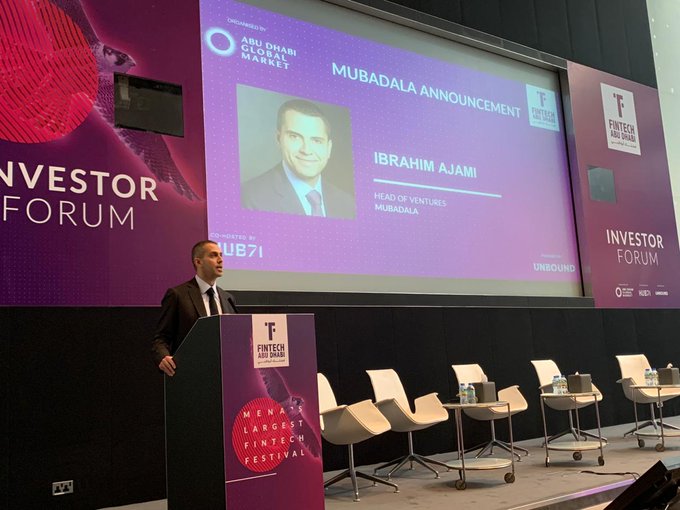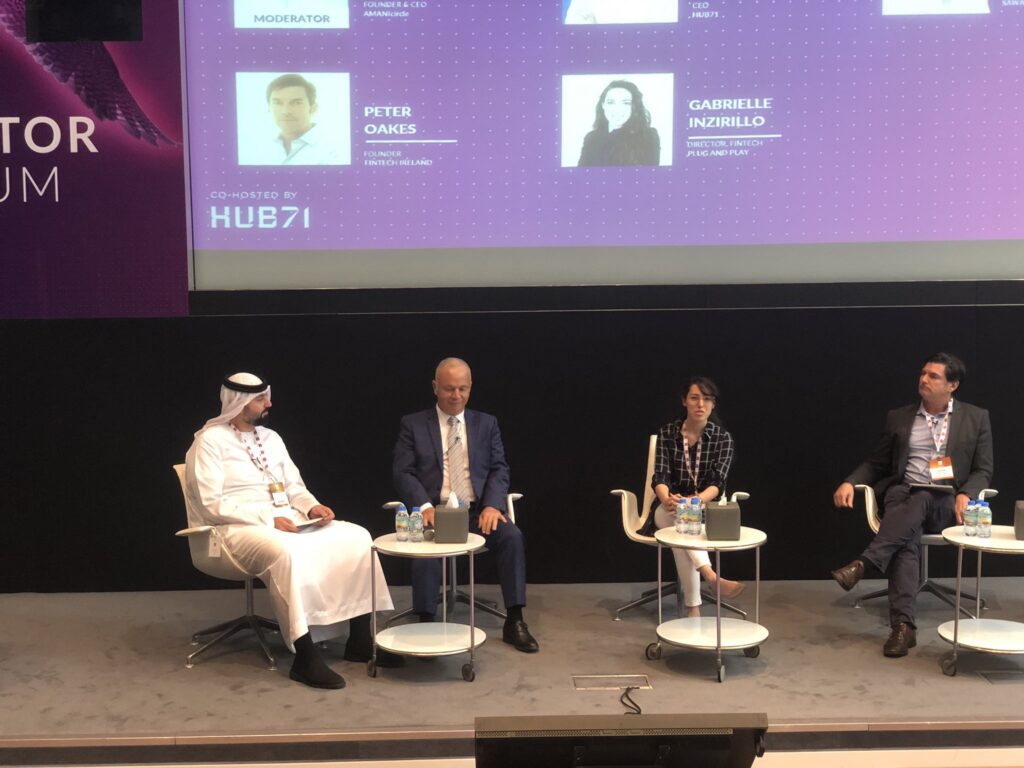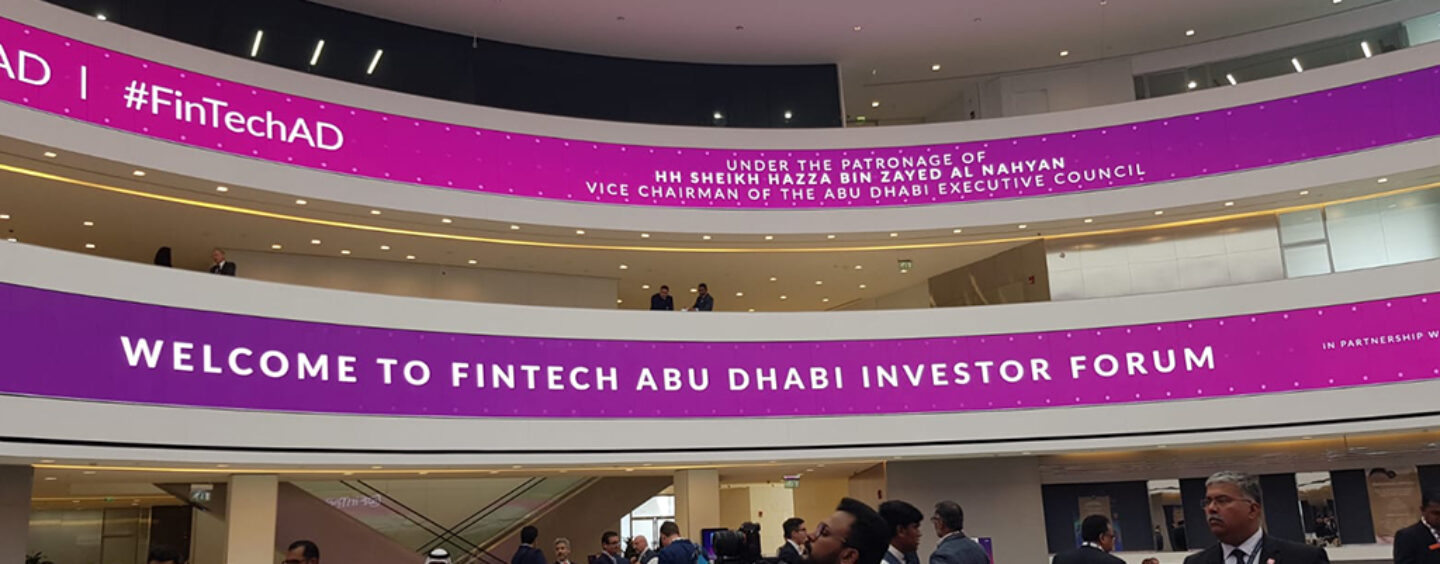Global investors are increasingly looking to the Middle East and North Africa for the next unicorn and high return investments, delegates in Abu Dhabi heard as the third edition of FinTech Abu Dhabi opened with the Investor Forum.
More than 400 people gathered at Abu Dhabi Global Market (ADGM) Authorities Building for the inaugural FinTech Abu Dhabi Investor Forum day where the growth of the FinTech industry in MENA was lead topic. Prominent regional and international entrepreneurs shared their expertise on growing a thriving start-up ecosystem in the region, how to spot a unicorn and the possibility of another financial crisis in 2020.
FinTech Abu Dhabi Festival continues tomorrow at Abu Dhabi National Exhibition Centre (ADNEC) with His Excellency Ahmed Ali Al Sayegh, Minister of State (UAE) and Executive Chairman of ADGM, giving the opening speech.
Recap of Day One – Investor Day on 21 oct 2019
Opening the festival, Richard Teng, CEO of Financial Services Regulatory Authority of ADGM, confirmed more than 5,000 people will attend the consecutive two-day FinTech Abu Dhabi event commencing on 22 October at ADNEC. He also outlined how the UAE, and the FinTech industry, are having a positive impact in the region.

Richard Teng | image via ADGM Twitter
He said:
“In the first half of 2019, the MENA region saw close to half a billion USD of VC (Venture Capital) funding in start-ups, excluding Souq and Careem. This is a 66% increase compared to the same period last year. More than a quarter of the funding was invested in the UAE, with the FinTech industry being the most vibrant sector, accounting for 17% of all deals done.
“Moving ahead, close to 500 FinTech companies in the Middle East will raise over USD 2 billion in venture capital funding in the next 3 years, based on a Milken Institute Report. And Abu Dhabi will be at the epicentre of this exciting development.”
He added:
“Great strides for FinTech have already been made in the MENA region, but there are massive opportunities for more. And there is no substitute for face-to-face meetings like today’s Forum to build closer ties, and find new ways to create value.”
Mubadala Launches $250 Million MENA Tech Fund

Ibrahim Ajami | image via Mubadala
Mubadala Capital today announced its first MENA-focused tech investment funds. With a total of US$250 million (AED 918 million), the Mubadala MENA tech investment funds will boost the growing start-up scene while empowering tech talent in the UAE and across the region. The funds include a US$150 million (AED 550 million) “fund of funds” program, which will invest in funds that are committed to supporting the Abu Dhabi-based Hub71 ecosystem, including investing in companies that leverage Hub71 for regional expansion and growth.
Ibrahim Ajami, Head of Ventures at Mubadala Capital, said:
“After ten years of investing in tech companies around the world, the time has come to leverage the experience and expertise we’ve gained for the benefit of our home market. The MENA funds will drive the economic development of Abu Dhabi by stimulating tech investment activity. There’s a huge amount of untapped potential in the UAE and the wider region and we are on the right path to foster more home-grown innovations, attract exceptional talent and accelerate the evolution of a flourishing tech industry in the Emirate.”
Insights From The UAE’s Leading CEOs

Mahmoud Adi, CEO of Hub71, discussing how we are creating a thriving ecosystem. via Hub71
Mahmoud Adi, CEO of Hub71, which provides access to capital and global markets, joined Peter Oaks, Director, FinTech Ireland, Gabrielle Inzirillo, Director FinTech, Plug and Play and Ahmed El Alfi, Founder and Chairman of Sawari Ventures on stage for a discussion on growing start-up ecosystems.
Mahmoud explained recognising talent is key to building a thriving start-up ecosystem. He said:
“When you look at any ecosystem that is thriving, there are key things that we can identify quickly. These are the ability to solve problems, unleashing their potential, achieving their dreams and working in a business environment.
“Another important aspect is talent. There is an exceptional team of smart and intellectual people in this region. Our job at Hub71 is to make sure they are aware of this potential and give them the ability to enhance their talent outside the region by putting structured programmes in place.”
Anticipating The Next Financial Crisis
The Forum heard from Aristedis Samitas, Chair of Finance of Zayed University, during the keynote session. He explained the importance of careful planning to ensure businesses are not hit hard financially in the market.
He said:
“The biggest challenge that we can face is a financial crisis. It not only directly affects the financial markets but also people and companies. We have to ensure we are ready whenever that takes place.
“One of the most important aspects is forecasting ahead. For many, it is a step into the unknown and we must ensure we are more comfortable with uncertainty and have to accept that there could be very little chance that the forecast made will be 100 per cent correct. Every decision and detail will affect the work and it is essential to revisit forecasts and make any necessary changes.”







